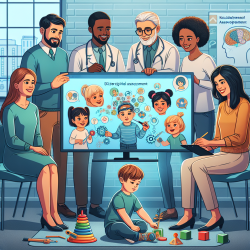Introduction
As a Special Education Director, understanding the nuances of cognitive deficits and dementia is crucial in providing effective support to students with special needs. The research article "Characterizing Cognitive Deficits and Dementia in an Aging Urban Population in India" offers valuable insights into the establishment and operation of memory clinics, which can significantly enhance the skills of practitioners in this field.
Understanding the Research
The study conducted in Mumbai, India, highlights the feasibility of developing memory clinics within public hospitals. It addresses the challenges of diagnosing and managing cognitive impairments in a diverse urban population. The research emphasizes the importance of cultural and linguistic considerations, which are critical in ensuring accurate assessments and diagnoses.
Implementing Research Outcomes
Practitioners can enhance their skills by integrating the following strategies from the research:
- Standardized Assessment Methods: Utilize structured clinical evaluations and neuropsychological tests modeled after established protocols to ensure accurate diagnosis and treatment planning.
- Cultural Sensitivity: Incorporate linguistic and cultural factors into assessments to improve communication and understanding with patients from diverse backgrounds.
- Outreach and Education: Engage in community outreach to raise awareness about cognitive impairments and the services offered by memory clinics. This can increase early detection and intervention.
- Interdisciplinary Collaboration: Work with a team of neurologists, psychologists, and social workers to provide comprehensive care and support to patients and their families.
Encouraging Further Research
While the study provides a solid foundation for developing memory clinics, further research is encouraged to explore the following areas:
- Longitudinal Studies: Conduct long-term studies to track the progression of cognitive impairments and the effectiveness of interventions over time.
- Comparative Analysis: Compare the outcomes of memory clinics in different cultural and socioeconomic settings to identify best practices and areas for improvement.
- Technological Integration: Explore the use of technology in assessments and interventions to enhance accessibility and efficiency.
Conclusion
The research on cognitive deficits and dementia in India provides valuable insights for practitioners seeking to improve their skills and the quality of care they provide. By implementing the outcomes of this research and engaging in further studies, practitioners can contribute to the development of effective memory clinics and improve the lives of individuals with cognitive impairments.
To read the original research paper, please follow this link: Characterizing Cognitive Deficits and Dementia in an Aging Urban Population in India.










